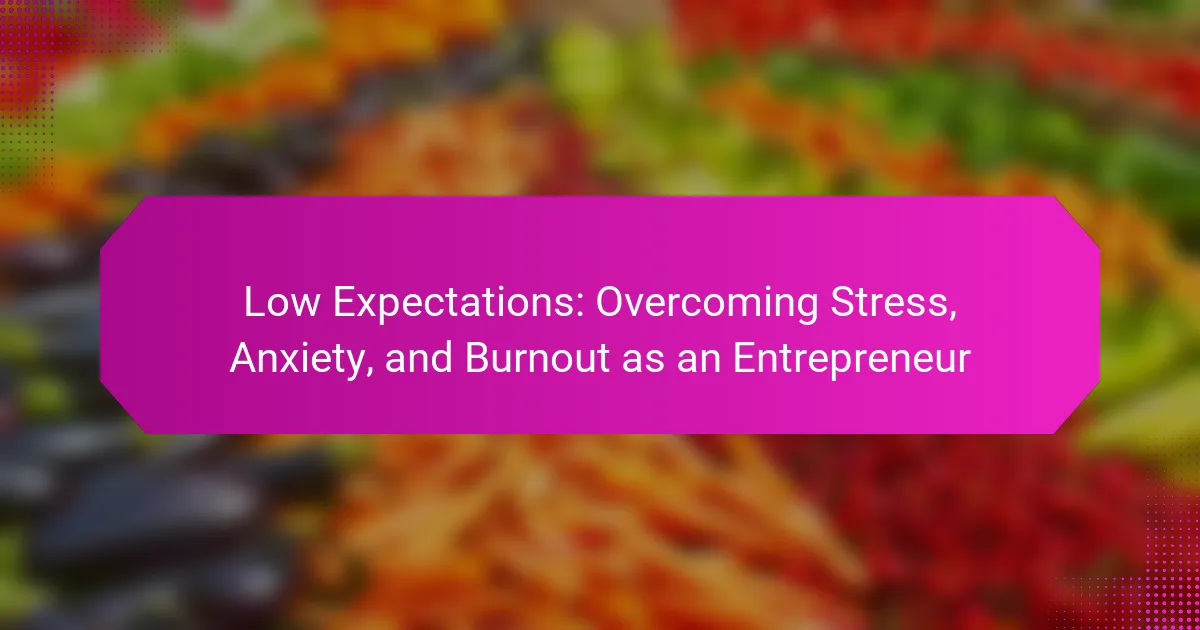Entrepreneurs often struggle with stress, anxiety, and burnout due to high expectations and the pressures of running a business. Low expectations can help alleviate this pressure, promoting sustainable work habits. Effective strategies include setting realistic goals, practicing mindfulness, and building a support network. Prioritising mental health is essential for enhancing resilience and improving overall business performance.

What are the common mental health challenges faced by entrepreneurs?
Entrepreneurs commonly face stress, anxiety, and burnout due to high expectations and uncertainty. These mental health challenges can hinder productivity and decision-making.
Low expectations can alleviate pressure, allowing for more sustainable work habits. Research indicates that 72% of entrepreneurs experience mental health issues, with anxiety and depression being prevalent.
Effective coping strategies include establishing a support network, practicing mindfulness, and setting realistic goals. Prioritising mental health can enhance resilience and overall business performance.
How does stress manifest in the entrepreneurial journey?
Stress manifests in the entrepreneurial journey through overwhelming pressure, leading to anxiety and burnout. Entrepreneurs often face unrealistic expectations, which can exacerbate feelings of inadequacy. This pressure can result in decreased productivity and impaired decision-making. Recognising stress signals early is crucial for maintaining mental well-being and sustaining business success. Implementing stress management techniques, such as mindfulness and time management, can help mitigate these challenges.
What are the signs of anxiety in business owners?
Business owners often exhibit signs of anxiety such as excessive worry, irritability, and difficulty concentrating. These symptoms can lead to stress and burnout, impacting decision-making and overall business performance. Recognising these signs early is crucial for effective management and maintaining productivity.
How can burnout impact productivity and decision-making?
Burnout significantly reduces productivity and impairs decision-making. It leads to mental fatigue, which diminishes focus and creativity. As a result, entrepreneurs may struggle to prioritise tasks effectively. Research indicates that burnout can decrease performance by up to 50%. This decline in cognitive function hampers the ability to make informed choices, ultimately affecting business outcomes. Addressing burnout through stress management techniques is crucial for maintaining high productivity levels and sound decision-making.

What are the universal coping strategies for managing stress and anxiety?
Low expectations can mitigate stress and anxiety for entrepreneurs. Universal coping strategies include setting realistic goals, practicing mindfulness, and maintaining a supportive network. These approaches help balance workload and enhance resilience, reducing the likelihood of burnout. Regular exercise and adequate sleep are vital, as they improve mental clarity and emotional stability. Engaging in hobbies fosters relaxation, providing necessary breaks from work-related pressures.
How can time management reduce stress levels?
Effective time management significantly reduces stress levels by fostering a sense of control and accomplishment. Entrepreneurs can prioritise tasks, set realistic goals, and allocate time wisely, which minimises overwhelm. Research indicates that individuals who manage their time effectively report lower anxiety and higher productivity. By establishing clear boundaries and schedules, entrepreneurs can avoid burnout and maintain a healthier work-life balance.
What role does physical health play in mental well-being?
Physical health significantly influences mental well-being by reducing stress, anxiety, and burnout. Regular exercise and proper nutrition enhance mood and cognitive function, fostering resilience in entrepreneurs. Studies show that physical activity releases endorphins, which combat stress and improve overall mental health. Additionally, maintaining a balanced diet supports brain health, leading to better decision-making and emotional stability. Prioritising physical health can be a unique strategy for entrepreneurs to manage the pressures of their roles effectively.
How can building a support network alleviate anxiety?
Building a support network can significantly alleviate anxiety by providing emotional reassurance and practical assistance. A supportive community fosters connection, offering entrepreneurs a safe space to share challenges and solutions. This interaction reduces feelings of isolation, which is a unique attribute of social support. Engaging with peers can lead to shared strategies for managing stress, enhancing resilience against burnout. As a result, entrepreneurs can maintain lower expectations, focusing on achievable goals rather than overwhelming demands.

What unique challenges do entrepreneurs face regarding mental health?
Entrepreneurs face unique challenges regarding mental health, including pervasive stress, anxiety, and burnout. These issues stem from high expectations, financial pressures, and the need for constant innovation.
Entrepreneurs often experience isolation, lacking a support network to share their burdens. This isolation can exacerbate feelings of stress and anxiety, making it harder to cope. Additionally, the pressure to succeed can lead to unrealistic self-expectations, contributing to burnout.
Another challenge is the blurred boundary between work and personal life. Entrepreneurs frequently work long hours, neglecting self-care and personal relationships, which can further deteriorate mental health.
Addressing these challenges requires a proactive approach, such as seeking support, setting realistic goals, and prioritising mental health alongside business objectives.
How does the pressure of financial uncertainty affect mental health?
Financial uncertainty significantly impacts mental health, leading to increased stress, anxiety, and burnout among entrepreneurs. The constant worry about finances can diminish focus and motivation, making it challenging to maintain productivity. Studies show that nearly 70% of entrepreneurs report mental health issues linked to financial pressures. Additionally, low expectations can exacerbate feelings of inadequacy, creating a cycle of stress. Addressing these challenges through support systems and stress management techniques is crucial for maintaining mental well-being.
What is the impact of isolation on entrepreneurs?
Isolation negatively impacts entrepreneurs by increasing stress, anxiety, and burnout. This can lead to decreased productivity and hinder decision-making. Entrepreneurs often face unique challenges, such as feeling disconnected from peers and lacking support networks. Research indicates that social isolation can exacerbate mental health issues, making it crucial for entrepreneurs to seek connections and support. Building relationships can mitigate the adverse effects of isolation and foster resilience.

What rare but notable mental health issues can entrepreneurs encounter?
Entrepreneurs can encounter rare mental health issues such as maladaptive perfectionism, which leads to chronic stress, anxiety, and burnout. This condition manifests as an unrealistic drive for flawlessness, causing significant emotional strain. Studies indicate that approximately 30% of entrepreneurs experience this unique attribute, leading to detrimental impacts on their well-being and productivity. Recognising and addressing maladaptive perfectionism is crucial for sustainable success and mental health.
How can imposter syndrome affect business owners?
Imposter syndrome can significantly hinder business owners by fostering low expectations, leading to increased stress, anxiety, and burnout. Entrepreneurs often doubt their abilities, which can result in decision paralysis and missed opportunities. This psychological barrier can diminish confidence, impacting overall performance and innovation. Studies indicate that around 70% of individuals experience imposter syndrome at some point, underscoring its prevalence among entrepreneurs. By recognising these effects, business owners can implement strategies to overcome these feelings and enhance their resilience.
What are the effects of chronic stress on long-term health?
Chronic stress significantly impacts long-term health by increasing the risk of cardiovascular disease, obesity, and mental health disorders. Entrepreneurs often face unique stressors that can exacerbate these effects. Prolonged stress leads to elevated cortisol levels, which can disrupt metabolism and immune function. As a result, individuals may experience fatigue, anxiety, and burnout, further reducing productivity and overall well-being. Addressing stress through effective management strategies is crucial for maintaining health and performance.

What actionable steps can entrepreneurs take to overcome mental health challenges?
Entrepreneurs can take several actionable steps to overcome mental health challenges. First, they should establish realistic goals to manage expectations and reduce stress. Practicing mindfulness techniques, such as meditation or deep breathing, can help alleviate anxiety. Building a support network with mentors and peers provides essential emotional support. Regular physical exercise is crucial for maintaining mental well-being. Lastly, seeking professional help when needed ensures that entrepreneurs receive appropriate care and strategies for managing burnout.
How can mindfulness practices be integrated into a busy schedule?
Mindfulness practices can be effectively integrated into a busy schedule by prioritising short, focused sessions. Start with brief meditation or breathing exercises during breaks. Utilise apps for guided mindfulness sessions that fit within your time constraints. Incorporate mindfulness into daily routines, such as mindful eating or walking, to enhance awareness without requiring extra time. Finally, schedule specific times for mindfulness throughout the week to ensure consistency, making it a non-negotiable part of your routine.
What are the best practices for setting realistic expectations?
Setting realistic expectations involves clearly defining achievable goals, prioritising tasks, and allowing flexibility for unforeseen challenges. Entrepreneurs should assess their resources and time realistically to avoid overwhelm. Regularly reviewing progress helps adjust goals as needed. Communicating openly with team members fosters a supportive environment, reducing stress and anxiety.
How can seeking professional help enhance mental resilience?
Seeking professional help can significantly enhance mental resilience by providing targeted strategies and support. Professionals can identify stressors and teach coping mechanisms tailored to entrepreneurs. This guidance helps manage stress, anxiety, and burnout effectively. Furthermore, regular sessions foster accountability, encouraging entrepreneurs to prioritise mental health. As a result, individuals develop a stronger mindset, improving their overall performance and decision-making.
What common mistakes should entrepreneurs avoid in managing their mental health?
Entrepreneurs should avoid setting low expectations, neglecting self-care, and ignoring signs of stress. These mistakes can lead to increased anxiety and burnout. Prioritise mental health by establishing realistic goals, maintaining work-life balance, and seeking support when needed. Regularly assess your mental state and adjust strategies to foster resilience.
How can neglecting self-care lead to burnout?
Neglecting self-care can significantly lead to burnout by increasing stress and anxiety levels. Entrepreneurs often prioritise work over personal well-being, resulting in diminished productivity and creativity. Chronic stress without adequate self-care can deplete mental and physical resources, making recovery difficult. Ultimately, this cycle can create a unique attribute of persistent exhaustion, hindering overall performance and satisfaction in both personal and professional realms.
What are the pitfalls of isolation in entrepreneurship?
Isolation in entrepreneurship can lead to low expectations, stress, anxiety, and burnout. Entrepreneurs may feel overwhelmed without support, hindering their decision-making and creativity. This isolation can create a negative feedback loop, where stress exacerbates feelings of loneliness, further diminishing motivation. Seeking connections and building a network are essential strategies to counteract these pitfalls. Engaging with peers can provide emotional support and foster innovative thinking.
How can unrealistic goal-setting exacerbate anxiety?
Unrealistic goal-setting can significantly increase anxiety by creating unattainable expectations. Entrepreneurs may feel overwhelmed when their goals exceed their resources or capabilities. This pressure can lead to chronic stress and burnout, ultimately affecting mental health and performance. Setting achievable goals fosters a sense of accomplishment, reducing anxiety levels and promoting well-being.


